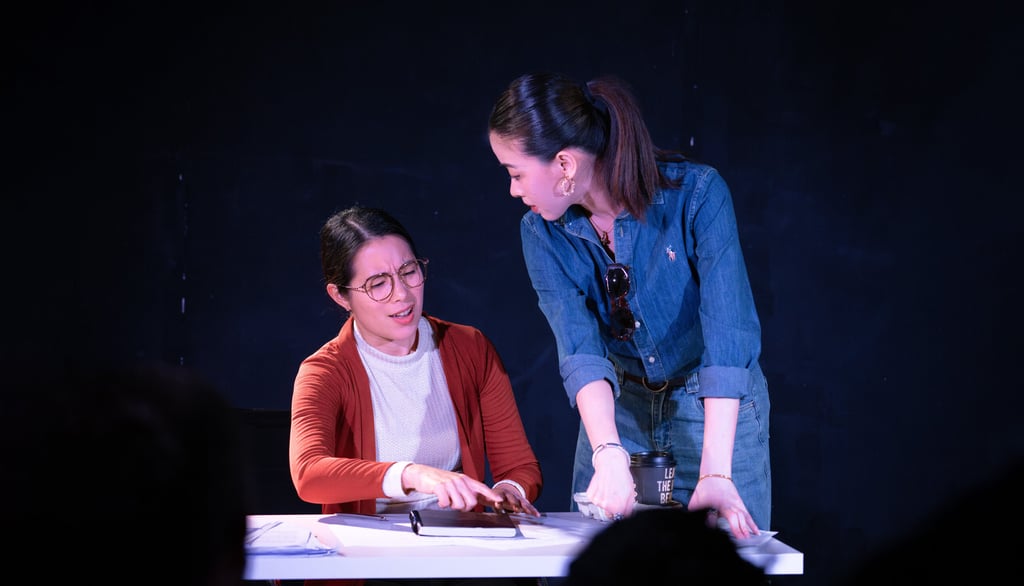REVIEW: Blacked-Out Blocks - Creation or Market? How Can Writers Survive in an Algorithm-Driven Era?
Review Date: 4th October 2025 @Theatre Deli
REVIEWS
Cassie Xue
10/5/20254 min read


©️Photo by Xinyu Lu
After emerging from the Camden Fringe, Blacked-Out Blocks once again takes to the stage at Theatre Deli. This is a thought-provoking and carefully crafted production that positions the writer and producer as representatives of two worlds: artistic freedom and market strategy. Through a collaboration between a novelist and a television producer, the play explores how, in today’s era dominated by algorithms, short-form content, and sensory overload, traditional storytelling is increasingly at odds with market demands. As creators and as audiences, how are we supposed to make a choice?
The story focuses on Philo (played by Carrie Au), a gentle and idealistic novelist dedicated to her craft, and her friend Parker (played by Vero April Zhou), a savvy television producer who keeps up with entertainment industry trends. Late at night, Parker arrives at Philo’s door with a decaf coffee and exciting news: her novel will be turned into a 28-episode TV series. Despite their different personalities, their views on storytelling are also quite different. Philo values complex emotional stories, thoughtful dialogue, and well-structured plots. In contrast, Parker emphasises visual impact, sex, violence, and death, elements driven by market demands and algorithmic appeal. Parker isn’t interested in telling good stories; she focuses on catching viewers’ attention, increasing engagement, and going viral.
As the adaptation process continues, Philo increasingly struggles to tolerate Parker’s vision. Her story is being pared down, key plot points are removed, emotional layers stripped away. This isn’t the story she wanted to tell. She simply wants her voice to be acknowledged. However, Parker, operating within the strict confines of a demanding industry, follows a system Philo finds harsh and incomprehensible. Each episode must be filled with “hooks,” more captivating than TikTok, aimed at capturing attention immediately. Philo’s eventual outburst only inspires Parker’s next idea: the deleted scenes and original concepts will be offered as unlockable bonus content - exclusive behind-the-scenes material.
Eventually, it goes viral, and everyone buzzes with anticipation. Parker makes Philo’s story a success, but then conflict erupts. Philo reveals that all decisions were made without her consent, accusing Parker of exploiting her for profit and misleading the audience. Parker claims she must do whatever it takes to survive and keep her visa. She films Philo’s emotional breakdown as part of the show’s appeal - betrayal, conflicts, and drama. Then, they promote Season 3, revealing it was just a promo. This irony prompts us to question if we truly enjoy the market’s offerings and if conflicts really satisfy audiences.
From a textual perspective, playwright Xinyu Lu communicates her message with clarity and conviction. As a young voice in theatre, Lu has created a clever and reflective piece. Her focus on how artists navigate the tension between artistic integrity and commercial success in the era of big data is clearly conveyed. The dialogue is sharp, flowing, and often humorous. Breaking the fourth wall effectively engages the audience with the philosophical questions posed. The first half of the play resembles a light-hearted sitcom, and the audience is quickly drawn into the dynamics of the characters’ relationships.
Nevertheless, some structural issues remain. While it’s clever to have Philo read aloud and comment on the rewrites as they occur, thus engaging the audience in her writing process, the pacing of the scene and the emotional development of the play could be tightened. Since the actual content of Philo’s novel is never directly incorporated into the performance, this segment might be slightly shortened, giving Philo more space to express herself beyond the act of writing.
As the play unfolds, the conflict between Philo and Parker increasingly feels didactic. They are no longer merely two individuals in disagreement; they become mouthpieces for opposing ideologies: creative purity versus market compliance. Some references to their university past are sprinkled in but never examined in detail. It’s common for characters to embody broader archetypes in a play — but they still need to appear as fully fleshed-out individuals. Who are they, truly? What do they want, what are their stakes, and what is at risk if they fail? The more depth their characters gain, the more naturally their arguments will emerge.
Despite this, the performances in Blacked-Out Blocks are outstanding. Both Carrie Au (Philo) and Vero April Zhou (Parker) bring their roles to life. Zhou is especially magnetic on stage - her energy, her delivery, and her physicality perfectly depict Parker’s ambition and charisma. She embodies the archetype of a high-stakes producer with finesse. Au, for her part, offers a layered portrayal of a gentle yet determined writer. Their chemistry is undeniable, and their scenes crackle with tension and vitality. Particularly in the moment when Philo turns on Parker, Au delivers a chilling intensity that shatters her previous gentleness.
Visually, the direction by Layla Se-Eun Kim is elegant and effective. The use of flashing lights to mark the passage of time is subtle yet powerful. The minimalist set design allows the actors to shine, which is especially wise in a two-hander play. The opening blue-purple tones capture Philo’s early emotional state, while later scenes incorporate flashing lights and sound cues, heartbeat rhythms, online comments, and Netflix startup tones that mirror the rising pressure and chaos in Philo’s world.
Blacked-Out Blocks is a sharp, timely production that confronts the dilemma of “creation versus market” head-on. Through the voices of two contrasting yet emotionally entwined women, the play provides a dialectical space for reflection. It raises essential questions and creates memorable theatrical moments. As one of the standout works developed through the Theatre Deli SHIFT+SPACE programme, Blacked-Out Blocks is a rising star worth watching.
★★★★
For more information, please visit: https://www.theatredeli.co.uk/event/enddate-blacked-out-blocks-by-nomreach-theatre
Credits
Playwright: Xinyu Lu
Director: Layla Se-Eun Kim
Producer: Ti Ti
Associate Producer: Miranda Yang
Stage Manager: Yuhan Zhao
Lighting Designer: Yuqing Wang
Costume Designer: Naomi (Ruizhi) Zhang
Sound & Video Operator / Marketing: Katherine (Meiyu) Guo
Graphic Designer: Rui Zheng & Xinyu Lu
Performer (Parker): Vero April Zhou
Performer (Philo): Carrie Au
About Nomereach Theatre: Nomereach Theatre is a London-based collective of international artists dedicated to experimental and cross-cultural storytelling. The company merges theatre, performance, and media to create works that question systems of power, identity, and meaning.
Sound Behind Curtain
A place for all Asian artists.
© 2026 Sound Behind Curtain. All rights reserved.
Your gift keeps the curtain rising for Asian creatives.
About
Contact
